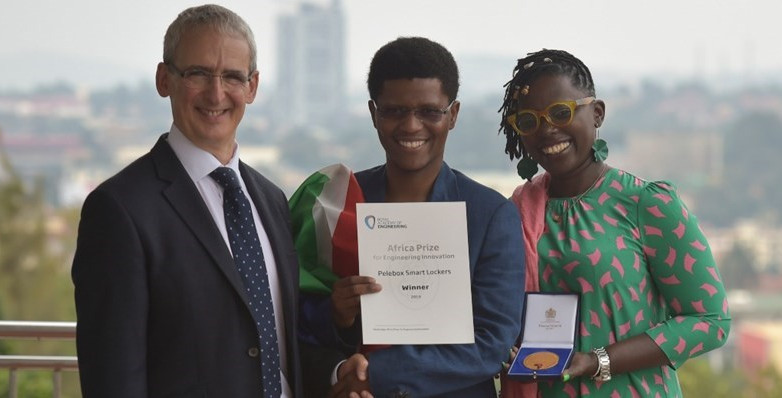South African innovator and Pelebox founder Neo Hutiri has won the Royal Academy of Engineering’s 2019 Africa Prize for Engineering Innovation.
The Africa Prize for Engineering Innovation is Africa’s biggest prize dedicated to engineering innovation. Now in its fifth year, it encourages talented sub-Saharan African engineers, from all disciplines, to develop innovations that address pressing problems in their communities in a new and appropriate way.
No ad to show here.
Hutiri (pictured above, centre) won the £25 000 ($32 800) first prize for Pelebox, a smart locker system designed to dispense medicine to patients with chronic conditions. The system is in use at public healthcare facilities in South Africa where it helps patients to avoid having to stand in long queues.
Pelebox founder Neo Hutiri said the startup will use the £25 000 prize money to ramp up production of the smart locker system
Four finalists from across sub-Saharan Africa delivered presentations at an awards ceremony in Kampala, Uganda, on Tuesday (4 June 2019), with the Africa Prize judges and a live audience voting for the most promising engineering innovation.
Three runners up each won £10 000. They are:
Kaoshi (Chukwunonso Arinze, Nigeria): Mobile app that connects money senders across the globe.
Smart Havens Africa (Anne Rweyora, Uganda): Sustainable smart homes built from appropriate and affordable technologies, designed to make home ownership more accessible to African women.
Sign-IO (Roy Allela, Kenya): Mobile app with smart gloves that track and translate sign language movements into speech and text in real time.
The Royal Academy of Engineering said in a statement on Tuesday that the Pelebox provides patients with access to their medication within 36 seconds, in contrast to the average three and a half hours it takes in other healthcare facilities.
Hutiri, commenting in the same statement, said winning the Africa Prize is “a massive achievement for us”.
“We can now ramp up our manufacturing efforts using the prize money. The networks we are part of will also be instrumental for the growth of our business,” added Hutiri.
Africa Prize judge John Lazar (pictured above, left), commenting in the same statement, said Hutiri is “a deserving winner”.
“Pelebox will improve healthcare for everyone using and working in a severely strained public healthcare system,” said Lazar.
Earlier this year, Pelebox was one of 20 African startups from Kenya, Nigeria and South Africa that took part in a series of intensive workshops in London with market leaders and tech incubators — as part of the UK’s Department for Digital, Culture, Media and Sport’s Go Global Africa 2019 programme.
The Africa Prize provides a unique package of support, including funding, comprehensive business training, mentoring and access to the Royal Academy of Engineering’s network of high profile, experienced engineers and experts.
Sixteen shortlisted Africa Prize entrants — from Burkina Faso, Nigeria, Kenya, South Africa, Uganda and Zambia — received eight months training and mentoring during which they learned to develop business plans and market their innovations.
The group also received coaching on communicating effectively, focusing on customers and approaching investors with confidence.
The sixth Africa Prize for Engineering Innovation is now open. Individuals and small teams living and working in sub-Saharan Africa, and who have an engineering innovation, are invited to enter. Entries close on 22 July.
Read more: Here’s who made shortlist of the 2019 Africa Prize for Engineering Innovation
Read more: 20 African startups selected for the UK’s Go Global Africa programme
Featured image, left to right: Africa Prize judge John Lazar, Neo Hutiri and with Iamthecode founder Mariéme Jamme (Royal Academy of Engineering)
